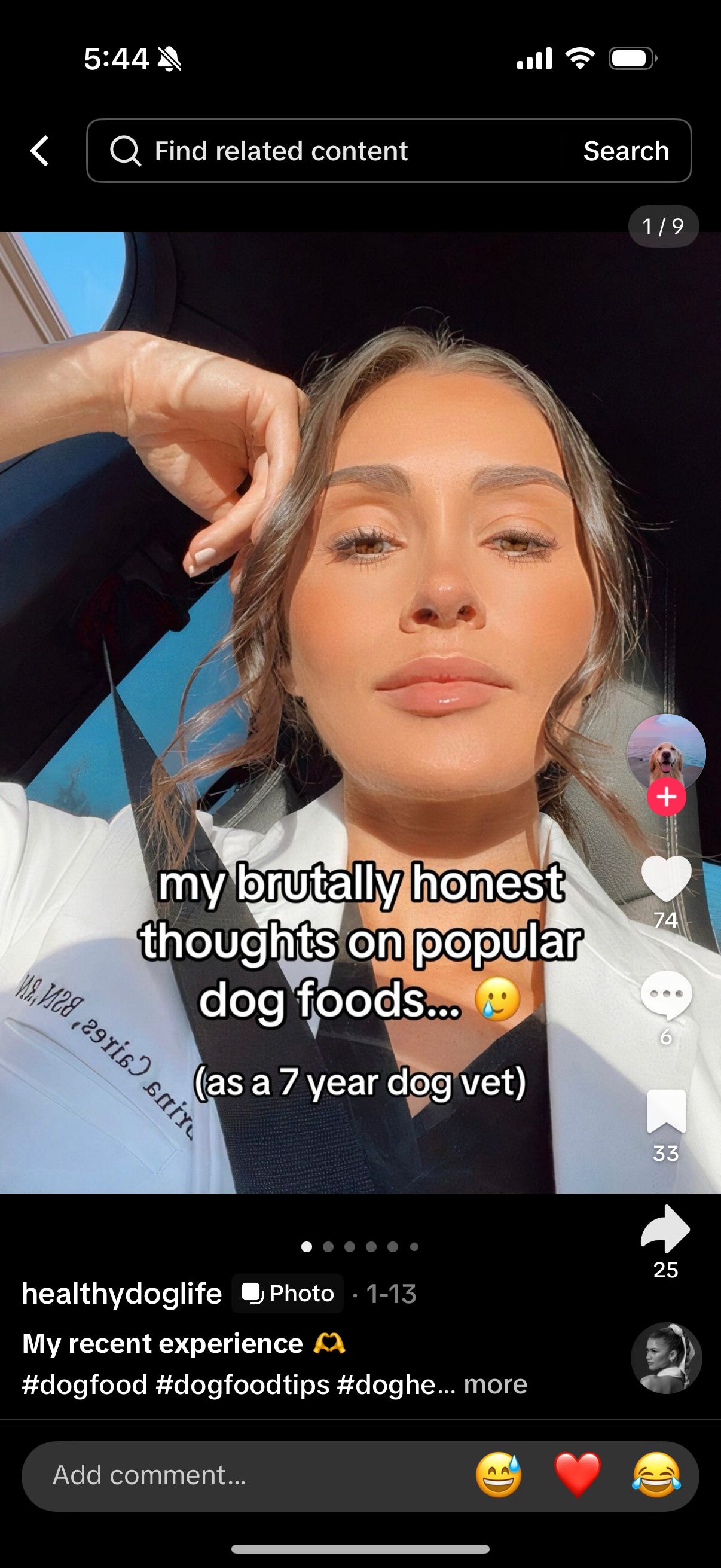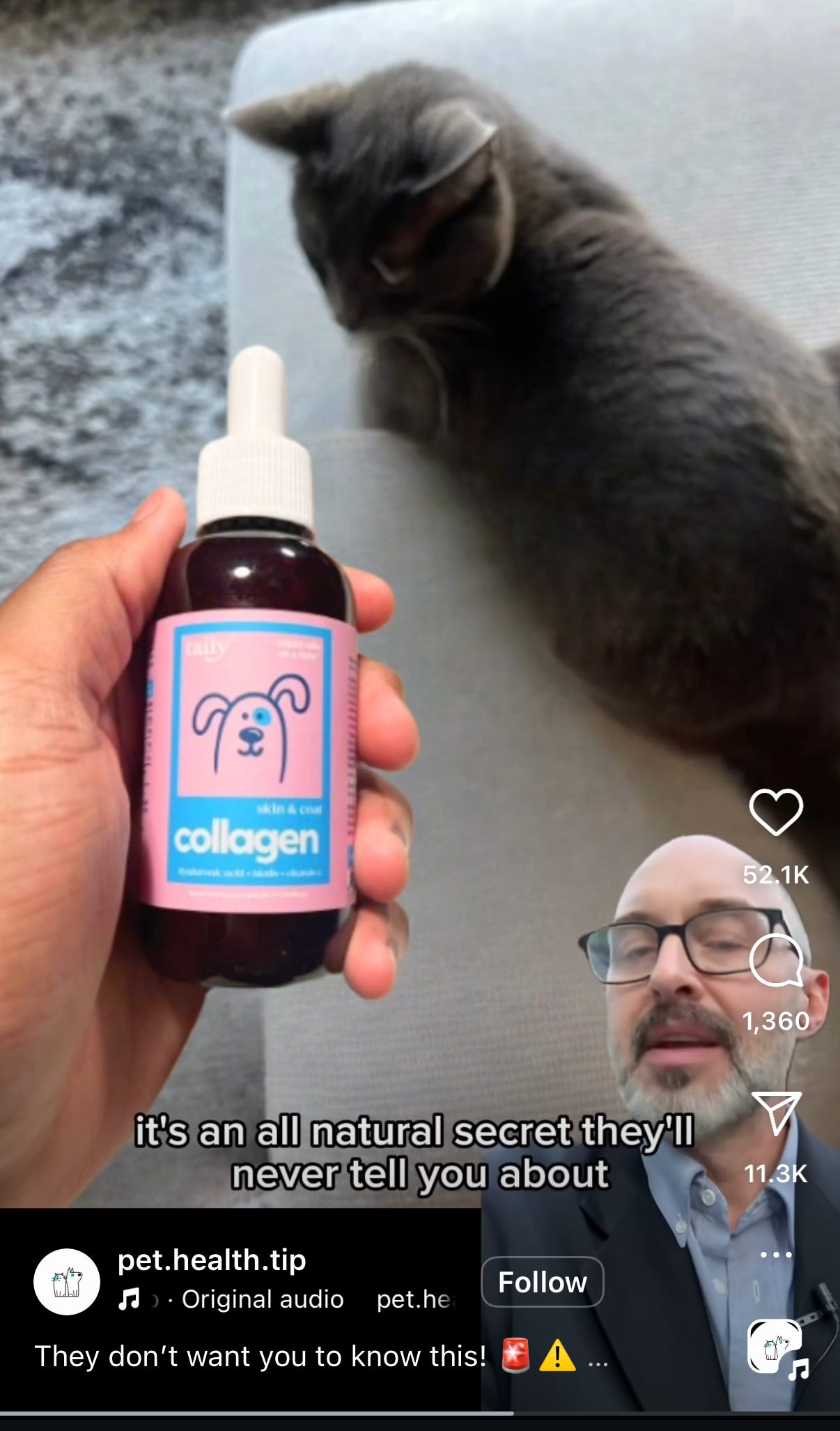Did a Fake Veterinarian Sell You Something? You're Not Alone.
The dubious to illegal ways people are using fake veterinarians to sell supplements.
If you’ve scrolled on Instagram or TikTok over the last few months you’ve probably seen these videos. They’re slide shows of “advice” from veterinarians, claiming they’re telling you secrets that other vets keep to themselves.
The problem? None of them are veterinarians. Some of them aren’t even people.
The Formula
“I’ve been a small breed veterinarian for 24 years. Here’s the TRUTH about products!”

“The vet industry is a TOTAL SCAM. I was a vet for 32 years and let me tell you…”

These are a few examples of the clickbait tactics accounts that promote supplements are using to sell products to pet owners. The formula is the same -
Appeal to authority. They claim to be veterinarians of x amount of years, or high paid veterinarians in certain cities. If you look in the second example you’ll see they’ve stolen the photo of a human nurse, the BSN, R.N. is easily seen on her jacket. The first photo? The background video is a real veterinarian. The person talking? An AI avatar.
List of nonsensical suggestions. Depending on the theme of the video, it’s either a list of products with arbitrary ratings (dog food brands they like or dislike and why) or random “secret advice” (fruits or vegetables you can feed your animal).
The sale. The last slide, the panacea for disease, the reason for the video - the product they’re selling.

Let’s dig a little deeper into these accounts.
AI Avatars to Impersonate Veterinarians
This is a newer tactic these accounts use. The Pet.Health.Tip video I share above has 2 million views - and the “veterinarian” is not even a real person.
This account is filled with essentially the same video. The veterinarian of x amount of years tell you vet med is a scam, here’s his solution to the scam. Every video uses the same talking face, wearing the same clothes, with the same deadpan delivery.
Who is this man? And what are his credentials?
Meet Doug. He is an AI avatar on an app called “Captions.” Creators and brands can browse the list of avatars, then insert a script and a background to sell products or make a fake podcast. In this case, he was used to pretend to be a veterinarian with the purpose of selling this product.
Stolen Photos to Impersonate Veterinarians

This is the oldest and most common one, and it’s not exclusive to veterinary medicine. In fact, I saw a series of slides of an American family claiming they moved to North Korea and this collagen brand was their biggest secret. No - I’m not kidding.
These accounts are similar to the AI one listed above - they claim expertise, use stolen photos, and sell something. They always link back to Amazon - which I’ll cover later.
Real People Pretending to be Veterinarians
This is “RobbLovesDogs,” claiming he euthanized several pets this week due to malnutrition. The cure for this malnutrition? A supplement.
Robb is not a veterinarian. And this isn’t the first time Robb has impersonated another medical professional to sell products.
Here’s Robb’s other TikTok account, where he sells things like parasite cleanses and energy gum. In one of his videos, he claims to be a dentist.
Robb’s dog account is filled with videos claiming pets are dying every day from malnutrition due to dog food. He makes a lot of easily debunked claims, filled with fear and lies. These videos have tons of comments (which he filters) and some videos have hundreds of thousands of views. He wears a scrub top and talks as though he’s a veterinarian in multiple videos.
Okay- Just Report Them!
Meta and TikTok don’t care.
You can report these accounts until you’re blue in the face and they will do absolutely nothing.
They don’t care that they’re impersonating medical professions
They don’t care that they’re using undisclosed AI
They don’t care that they’re stealing photos
They don’t care that they’re not disclosing affiliate links
And even if they did, there are thousands of these accounts. If you shut one down, another pops up in its place. You might have some success getting a TikTok affiliate shop shut down. These are tied to social security numbers or an EIN, since the creators earn an income when you purchase through their link. They are harder to start back up, as you need to grow a certain viewership before you can monetize with brands.
The other accounts that use Amazon links? They post multiple times a day, across multiple platforms, using the same videos. They can abandon an old account and open a new one easily.
Why the Amazon Links?
Amazon has an affiliate program, which allows creators to make money off products they recommend. Most brands have similar programs, where creators are given discount codes or special links. It’s a way to give back to creators for recommending their brands and it’s a totally legit way to make money.
When it’s disclosed.
But affiliate links on Amazon go beyond just giving a creator money for buying that product. They also give the creator a portion of anything else they buy in a certain time frame. If you used their link to buy collagen for your dog, then some printer ink, a new dog bowl and a t-shirt they see income from that too.
That’s why these videos ALWAYS mention that they purchase the item from Amazon. They ALL have an Amazon affiliate link in their bio.
My suggestion - report these accounts to Amazon for not disclosing they’re affiliate links.
Much like TikTok shop, Amazon affiliate program has guidelines behind who can monetize. This means they need social security numbers or an EIN in order to report how much a person is making.
Making an entirely new Amazon affiliate account is MUCH harder than a new Instagram or TikTok account.
And because they are not disclosing they’re using an affiliate link, they are in violation of FTC rules AND Amazons rules.
You can report them here.
What About the Brands?
This is where it gets tricky.
We don’t know who’s behind many of these accounts. Between AI avatars and stolen photos, it’s impossible to know who’s running the account. Brands don’t really have control over who uses their product and who promotes it. They don’t approve affiliates through Amazon, and they have limited control on TikTok shop as well.
However.
There are two brands that use this marketing tactic time and time again. These same two brands can be found behind 90% of these posts. When you reach out to these brands to let them know, they don’t reply. They don’t condemn the creators, they don’t apologize. They don’t get the videos taken down.
They’re silent.
What Can the Consumer Do?
Do not share these videos. Sharing, liking, commenting, engaging - it tells the algorithm to share these videos.
Report them to Meta or TikTok, but be aware it likely will go nowhere. Maybe enough reports will eventually shut them down.
Reach out to Amazon if there’s an affiliate link you feel is not disclosed
If the video is making a healing claim (“this CURES x disease”) you can report it to the FDA here. “Dietary supplements cannot legally claim to cure, treat, mitigate, or prevent any disease, as these claims are reserved for drugs.”
These accounts are very frustrating for those of us in the veterinary field. They demonize the field, claiming we’re keeping some big secret from pet owners to keep animals sick. At the end of the day, we care deeply about pets. We want to make sure owners aren’t being scammed by these products.
The unfortunate truth is these people have learned they can guilt owners into buying things, and as long as they line their pockets they don’t care who gets hurt.






